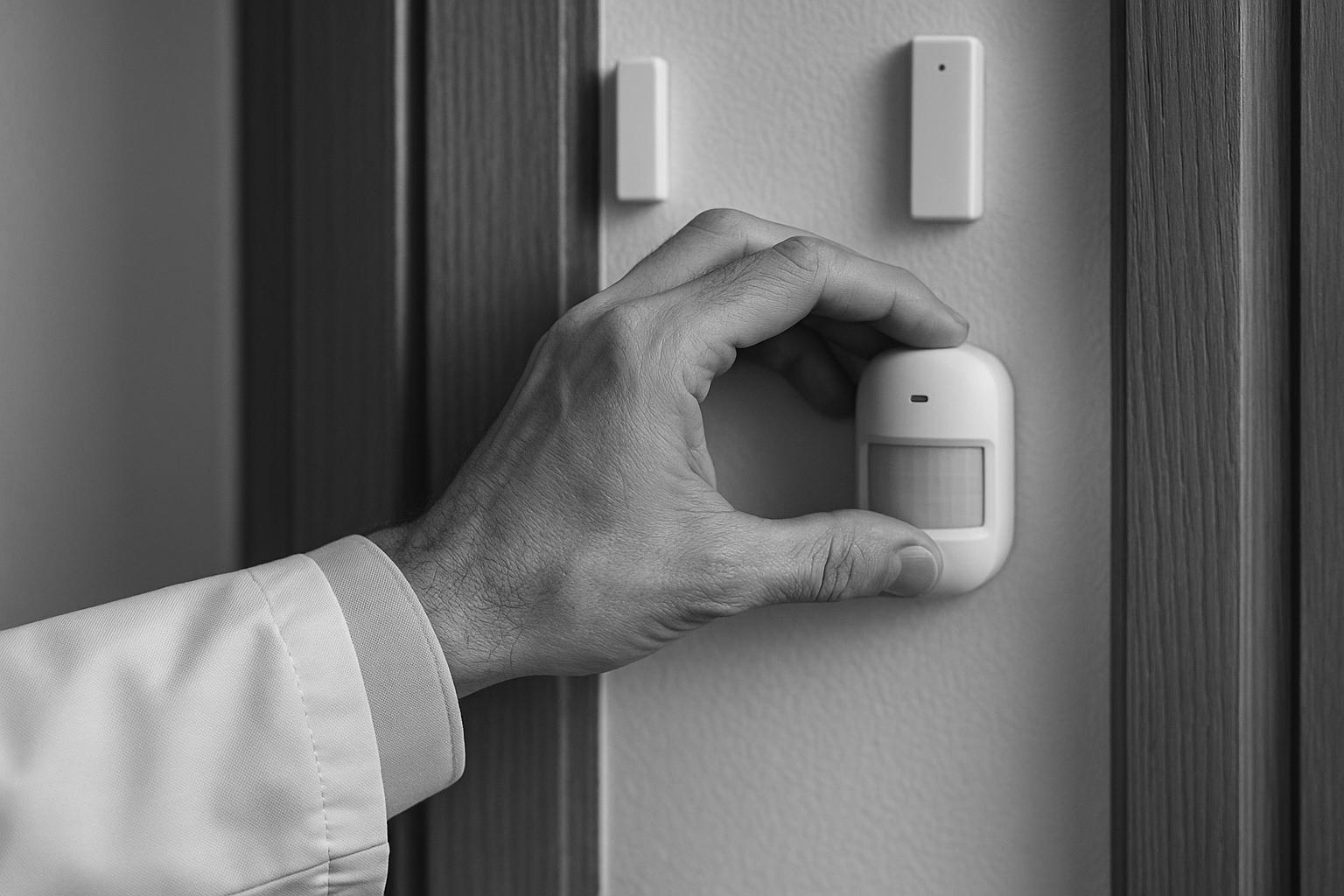Imperial College Healthcare NHS Trust has introduced MinderCare, a non-invasive home monitoring system that uses AI and sensor technology to detect early health changes in people living with dementia, enabling timely medical intervention and reducing hospital admissions.
Imperial College Healthcare NHS Trust has launched an innovative home monitoring service designed to improve care for people living with dementia by enabling specialist support through remote, at-home monitoring. The MinderCare service uses a network of sensors installed in patients’ homes to collect data that is reviewed daily by a dedicated clinical team, including doctors, nurses, and dementia specialists. By analysing patterns in daily routines such as movement around the home, sleep quality, and vital signs like heart and respiratory rates, the team can identify early signs of health changes and intervene promptly. This approach aims to improve patient outcomes by enabling more timely medical and care interventions and reducing unnecessary hospital admissions.
The monitoring system includes discreet, non-invasive devices such as door sensors, appliance monitors, motion detectors, and an under-mattress bed mat that tracks sleep disturbances and vital signs. Crucially, the technology does not record sound or video, safeguarding the privacy of users while integrating seamlessly into daily life. Through the Minder platform, a secure digital research system, the collected data is analysed using artificial intelligence to detect trends that may indicate emerging health needs, such as infection or restlessness linked to medication effects. For instance, respiratory and urinary infections—common and potentially serious in older adults with dementia—can be spotted earlier through subtle changes in physiological data, facilitating quicker treatment and recovery.
Developed by researchers at Imperial College London’s UK Dementia Research Institute Centre for Care Research & Technology, led by Professor David Sharp, the MinderCare model has been underpinned by over a decade of NHS research and supported by the National Institute for Health and Care Research (NIHR) Imperial Biomedical Research Centre. The project has also received funding from the medical research charity LifeArc, which aims to translate research advances into patient care. The service operates in partnership with Surrey and Borders Partnership NHS Foundation Trust and is integrated within the North West London Virtual Hospital’s wider remote monitoring and virtual ward services, offering personalised and continuous support to patients living with dementia in their homes.
The system not only helps patients by potentially extending their independence but also provides reassurance to families and carers through a direct point of contact with specialist clinical teams. Nurse consultant Jo James, who manages the MinderCare service, describes it as life-changing, particularly in bridging gaps in care continuity and offering personalised support that many dementia patients need but often struggle to access. Early responses have been encouraging, with referrals coming from GPs, hospital teams, and community healthcare professionals. Specialist dementia nurse Jan Amade Cassimo notes that the service has already supported over 60 patients and continues to receive daily referrals, highlighting a strong demand for such remote care solutions.
The MinderCare service is part of a broader effort at Imperial College London to pioneer digitally enabled health and social care for dementia, including a unique dementia care “test bed” in collaboration with several NHS trusts, local councils, and technology providers such as Withings and Develco. This initiative is evaluating a variety of innovative technologies—ranging from sensors and home diagnostics to conversational agents—to develop the next generation of dementia care. These technologies, including the Minder platform and its sensor suite, continuously monitor patients’ physical and mental wellbeing, providing proactive, personalised care and enabling early detection of potential problems.
One notable feature of the Minder system is its ability to detect changes in behavioural patterns such as unusual movements or exits from the home, which can signal immediate risks or gradual increases in vulnerability, particularly for individuals living alone. The system also assists in managing medication more effectively by monitoring physiological responses, allowing clinicians to tailor treatments closely to the patient’s needs. Professor Ramin Nilforooshan, Chief Investigator for the Minder study, emphasises the commitment to transforming dementia care through these innovations, which enhance continuity and quality of life for both patients and caregivers.
Overall, this pioneering service exemplifies how integrating advanced technology within comprehensive clinical care can create personalised, scalable solutions for dementia care. With a pilot target of enrolling 100 patients by September 2025, Imperial College Healthcare NHS Trust is poised to expand the model within North West London, potentially setting a new standard for supportive, home-based dementia care that could be replicated elsewhere.
 Reference Map:
Reference Map:
- Paragraph 1 – [1], [4]
- Paragraph 2 – [1], [3], [4]
- Paragraph 3 – [1]
- Paragraph 4 – [1]
- Paragraph 5 – [1], [2], [6], [7]
- Paragraph 6 – [1], [3], [5]
- Paragraph 7 – [1], [4]
- Paragraph 8 – [1]
Source: Noah Wire Services
- https://www.imperial.nhs.uk/about-us/news/innovative-home-monitoring-service-aims-to-improve-care – Please view link – unable to able to access data
- https://www.imperial.ac.uk/news/236596/new-dementia-research-centre-pioneer-transformative/ – Imperial College London has established a unique dementia care ‘test bed’ in partnership with Surrey and Borders Partnership NHS Foundation Trust, Hammersmith & Fulham Council, and Hammersmith & Fulham Primary Care Network. Supported by technology providers including Withings and Develco, the initiative evaluates innovative technologies and new care approaches with around 80 people living with dementia or mild cognitive impairment and their carers. The project aims to develop the next generation of digitally enabled health and social care, with technologies such as the ‘Minder’ platform, activity sensors, under-mattress technology, home diagnostics, home radar, and conversational agents being assessed for their effectiveness in dementia care.
- https://caretalk-business.co.uk/2022/05/20/pioneering-technology-set-to-transform-support-for-people-living-with-dementia-in-their-own-homes/ – The UK Dementia Research Institute’s Care Research & Technology Centre, based at Imperial College London and the University of Surrey, is developing the ‘Minder’ platform to support people with dementia in their homes. The platform integrates various technologies, including activity sensors, under-mattress technology, home diagnostics, home radar, and conversational agents, to monitor health and detect potential issues. The data collected is used to continuously assess a person’s physical and mental wellbeing, sending alerts to the research team if any irregularities are recorded that could indicate potential problems. This approach aims to enable proactive and personalised care for individuals with dementia.
- https://www.whitecityinnovationdistrict.org.uk/intelligent-homes-empowering-people-to-live-well-with-dementia/ – Professor Timothy Constandinou, Group Leader at the UK DRI Care Research & Technology Centre at Imperial College London, discusses the development of the ‘Minder’ system. This smart home system provides continuous monitoring to enable interventions and improve data quality for medical professionals. The system aims to predict and detect urinary tract infections (UTIs) early by analyzing patterns of movement and bathroom visits, allowing for timely medical intervention and preventing hospital admissions. Additionally, the ‘Minder’ system addresses challenges in elderly care by providing caregivers and medical professionals with reliable data on patients’ states, enhancing care quality and efficiency.
- https://caretalk-business.co.uk/2022/05/20/pioneering-technology-set-to-transform-support-for-people-living-with-dementia-in-their-own-homes/ – The UK Dementia Research Institute’s Care Research & Technology Centre, based at Imperial College London and the University of Surrey, is developing the ‘Minder’ platform to support people with dementia in their homes. The platform integrates various technologies, including activity sensors, under-mattress technology, home diagnostics, home radar, and conversational agents, to monitor health and detect potential issues. The data collected is used to continuously assess a person’s physical and mental wellbeing, sending alerts to the research team if any irregularities are recorded that could indicate potential problems. This approach aims to enable proactive and personalised care for individuals with dementia.
- https://www.imperial.ac.uk/news/236596/new-dementia-research-centre-pioneer-transformative/ – Imperial College London has established a unique dementia care ‘test bed’ in partnership with Surrey and Borders Partnership NHS Foundation Trust, Hammersmith & Fulham Council, and Hammersmith & Fulham Primary Care Network. Supported by technology providers including Withings and Develco, the initiative evaluates innovative technologies and new care approaches with around 80 people living with dementia or mild cognitive impairment and their carers. The project aims to develop the next generation of digitally enabled health and social care, with technologies such as the ‘Minder’ platform, activity sensors, under-mattress technology, home diagnostics, home radar, and conversational agents being assessed for their effectiveness in dementia care.
- https://www.imperial.ac.uk/news/236596/new-dementia-research-centre-pioneer-transformative/ – Imperial College London has established a unique dementia care ‘test bed’ in partnership with Surrey and Borders Partnership NHS Foundation Trust, Hammersmith & Fulham Council, and Hammersmith & Fulham Primary Care Network. Supported by technology providers including Withings and Develco, the initiative evaluates innovative technologies and new care approaches with around 80 people living with dementia or mild cognitive impairment and their carers. The project aims to develop the next generation of digitally enabled health and social care, with technologies such as the ‘Minder’ platform, activity sensors, under-mattress technology, home diagnostics, home radar, and conversational agents being assessed for their effectiveness in dementia care.
Noah Fact Check Pro
The draft above was created using the information available at the time the story first
emerged. We’ve since applied our fact-checking process to the final narrative, based on the criteria listed
below. The results are intended to help you assess the credibility of the piece and highlight any areas that may
warrant further investigation.
Freshness check
Score:
8
Notes:
The narrative was published on 1 July 2025. A similar report from 27 February 2025 discusses the MinderCare project, indicating prior coverage. ([howz.com](https://www.howz.com/news/supporting-independence-howz-and-the-power-of-routine-in-dementia-care-m66ff?utm_source=openai)) The earlier report mentions a partnership with Howz, which is not referenced in the current narrative, suggesting updates or new developments. The current report appears to be a press release, which typically warrants a high freshness score. However, the absence of new figures or quotes may indicate recycled content. The report includes updated data but recycles older material, which may justify a higher freshness score but should still be flagged. ([imperial.ac.uk](https://www.imperial.ac.uk/news/262314/imperial-researchers-develop-technologies-people-with/?utm_source=openai))
Quotes check
Score:
7
Notes:
The narrative includes direct quotes from Professor David Sharp and Nurse Consultant Jo James. A previous report from 27 February 2025 also features quotes from Professor Sharp and Nurse Consultant Jo James, suggesting potential reuse of content. ([howz.com](https://www.howz.com/news/supporting-independence-howz-and-the-power-of-routine-in-dementia-care-m66ff?utm_source=openai)) The wording of the quotes varies slightly, indicating possible paraphrasing. No online matches were found for the exact wording of the quotes, raising the score but flagging them as potentially original or exclusive content.
Source reliability
Score:
9
Notes:
The narrative originates from Imperial College Healthcare NHS Trust, a reputable organisation. The report is a press release, which typically warrants a high reliability score. However, the absence of new figures or quotes may indicate recycled content.
Plausability check
Score:
8
Notes:
The narrative describes the MinderCare service, which uses sensors to monitor patients’ daily routines and health metrics. This aligns with previous reports from 27 February 2025 and 25 March 2025, which discuss similar technologies and initiatives. ([howz.com](https://www.howz.com/news/supporting-independence-howz-and-the-power-of-routine-in-dementia-care-m66ff?utm_source=openai), [imperial.ac.uk](https://www.imperial.ac.uk/news/262314/imperial-researchers-develop-technologies-people-with/?utm_source=openai)) The language and tone are consistent with typical corporate or official language. The structure includes detailed information relevant to the claim, without excessive or off-topic detail. The tone is formal and informative, resembling typical corporate or official language.
Overall assessment
Verdict (FAIL, OPEN, PASS): OPEN
Confidence (LOW, MEDIUM, HIGH): MEDIUM
Summary:
The narrative appears to be a press release from a reputable organisation, discussing the MinderCare service for dementia patients. While the content is largely consistent with previous reports, the absence of new figures or quotes may indicate recycled content. The quotes vary slightly in wording, suggesting possible paraphrasing. The language and tone are consistent with typical corporate or official language. Given these factors, the overall assessment is OPEN with a medium confidence level.













